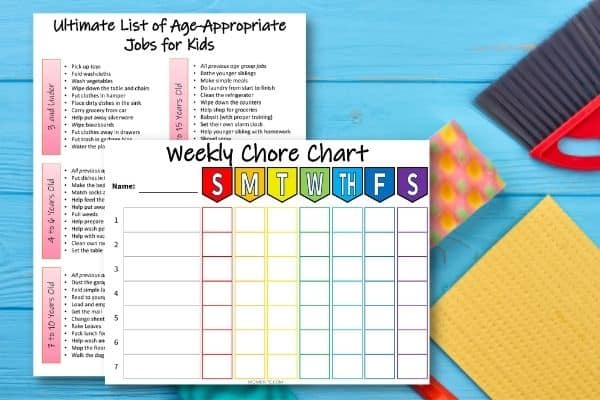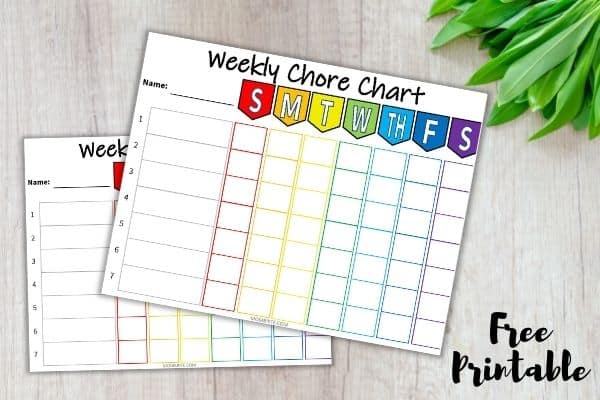Kids love doing chores because having responsibility gives them a sense of belonging. Here’s a free printable weekly chore chart template plus a chore list by age to get your kids started!

I want you to be honest and ask yourself this question: How much of what you do during the day can be done by your children? For example, are you the one taking out all the trash in the house on garbage day? Or watering all the house plants?
Children are a lot more capable than you think. And as part of the family, they should be expected to contribute to house chores. Plus, chores are fun for kids and they give kids confidence that they are an integral part of the family.
However, doing chores is probably not at the top of your child’s priorities. Therefore, here is a free printable weekly chore chart template for kids that you can customize and use to keep track of what chores are being completed.
It is also important to pick age-appropriate tasks for kids. For example, expecting a 4-year-old to wash the dishes may lead to more broken dishes than clean ones. Below you’ll find a chore list for kids that will help you fill out the chore chart and hold your children responsible for the selected tasks.
Table of Contents
Benefits of Having Kids Do Chores
There are so many benefits to giving your kids chores to do around the house. Even though sometimes it’s easier and faster for you to do the tasks yourself, doing chores is important for your child’s development. Here are some examples of ways chores can benefit your kids:
- Doing chores will boost your child’s self-esteem and allow them to feel more capable and independent.
- Doing chores gives your kids an opportunity contribute to the household in meaningful ways.
- Doing chores promotes teamwork as the family members all clean the house together and help each other out as a “team”.
- Doing chores instills good habits of cleaniness and tidiness.
- Doing chores helps your kids learn important life skills.
- Dong chores can mean less stress for the parents to maintain the house.
Chore List by Age
Sometime it’s not easy to come up with jobs kids can do to tidy up the house. But kids as young as toddlers can complete simple chores around the home, such as putting their toys away or wash vegetables for dinner.
Having a younger kid do something that’s way too hard for his age group will discourage him and ruin his confidence. Older children should already be doing the tasks the younger kids can do and need more challenging chores to feel capable and significant.
Here is a list of age-appropriate chores for different age-levels (toddlers all the way up to teenagers) that will help you determine what chores you can assign your kids. Or even better, you can read the list to your kids and have them decide what will go on their chore chart this week. They are more likely to do chores when they are the ones who picked them!
Free Printable Weekly Chore Chart Template
Here is a great weekly chore chart that you can print out and use to keep track of all the household chores your kids are responsible for. Simply click on the picture or here and fill out the download form to get the chore chart PDF delivered right to your inbox.
To use the weekly chore list, first select the tasks you would like your children to complete for the week. Write them all down on the left side of the chart. Then as your children finish the tasks, you can write a checkmark or add a star sticker in the boxes provided underneath each day of the week.
If you plan to reuse this printable over and over again, I suggest laminating the chore chart with a trusty laminator to make it more durable and last longer. You can then use a dry-erase marker to write on the laminated sheet and wipe off the chart clean with tissue to start a new week. Alternatively, you can use magnet square or velcro dots to attach the chores and checkmarks or stars to the weekly chore chart.
Before you start tossing laundry, dishes, and other household tasks at your kids, you must remember that we are not born with the knowledge of how to fold the laundry or wash dishes. Some tasks that seem to be second nature to you may be challenging for your children to accomplish.
Let’s jump in and discuss what chores can your children do around the house no matter how young they are and how you can train your children and set them up for success!
How to Get Your Kids to Do Chores
Before you sit back and sip on your long-desired cup of coffee that you made 5 hours ago, you need to take time to train your kids. Getting proper training will motivate your kids to actually do the chores and develop important skills that they will use for the rest of their lives.
Here are tips on how to train your kids to do chores:
1. Before You Start Training, Make Sure That…
- Your child is in a good mood and not under any stress.
- Your child has gotten enough sleep and is not hungry.
- You are at home and have all the tools available for training.
2. Make It Fun!
Remember, we want the kids to be excited about chores. Review the ground rules for chores to make sure that you keep the training interesting and light for the kids. Use your imagination and do some pretend-play with your child, like having them set up the table for dinner with you and some hungry teddy bears.
3. Be Positive.
Be patient during the training and never lose your temper! Your kids are trying hard to learn how to do an adult task, so encourage them wholeheartedly and motivate them to keep trying.
4. Repeat and Repeat Back.
I know when I am new to a job, I need my trainer to do the same thing multiple times before I can understand how to do it myself. Your child may need to see you do the task again and again before he can start picking it up himself.
After he seems to grasp how to do the chore, have him be the instructor and pretend to teach you how to do it. If he can do that, then you can be sure that he fully understands the process.
5. Recognize When You Should Stop.
If your child is just not getting it or just not feeling up to the task that day, tell them in a calm voice, “I see that you are tired. Let’s try this again another day when you have more energy.” Don’t force training on a child – you will just run into power struggles and end the training on a negative note.
6. Add the Chore to the List and Step Back.
After your child has mastered the chore, add it to the weekly chore list. And when it comes time to do the task, LET YOUR CHILD DO IT. Don’t try and intervene right away if you see your child struggling – give him a chance to figure it out. Only step in when your child asks you for help. Otherwise, it’s time for that coffee!

What if My Kids Refuse to Do Chores?
Let’s admit it, chores are tedious. That’s why we don’t want to do them as parents. We rather kick our feet up and binge-watch Netflix than mopping the floor or dusting the shelves.
BUT CHORES HAVE TO BE DONE.
Your kids may be initially excited about the opportunity to pitch in around the house. But after a while, the novelty wears off. Now what?
Here are some ways to address chore battles:
When-Then
How many times do you find yourself yelling at your kids repeatedly, “If you don’t do x, then you don’t get y!” If you are like me before taking the Positive Parenting Solutions course, too many to count.
The When-Then tool changes the “If” to a “When” because we are not telling our children that there is an option to complete the task at hand. State “when x, then y” (x being the stuff needs to be done and y being the privilege, aka something your kid truly wants) and walk away.
Your kid might be stunned at first. He might throw a tantrum. But since I have implemented the When-Then tool in my house, THINGS GET DONE. It’s such a useful tool because it eliminates the power struggle by you simply stating the scenario and disengage. It’s also a quick tool to implement so you can start today!
Set Routines for Chores
Kids thrive on routines because they know what to expect. Nobody likes surprises.
Routines are a series of the When-Then tool that we talked about above. When you finish setting up the table, then we eat. When you finish bringing the dirty plates to the sink, then you When you finish brushing your teeth, then we read a bedtime story.
Set a routine with the chores and practice the same routine every day. Eventually, your kids will be going along with the routine without even thinking about it.
Logical Consequences
Have well-thought-out logical consequences, or delaying or denying a privilege, as you plan out the chores for your kids. If you are using When-Then statements, your child will not receive the privilege promised after the “Then…”
Do not think of consequences in the heat of the moment. Emotions will cloud your judgment, and the consequences may not make sense or practical for the situation.
Always have backup consequences. For example, you can calmly say to your child, “when you finish picking up your toys, then you get to eat dinner. However, since you are not going to be serving dinner at midnight, you can set a time limit with a visual timer and say that the kitchen closes in 30 minutes.
After 20 minutes, if your child is still refusing to pick up his toys, then reveal the backup consequence – Any toys that are still on the floor by the time 30 minutes are up will go into a box in the garage and will be unavailable for your child to play with for two weeks.
Needless to say, if your child is being stubborn and refuses to budge, then follow through with the consequence and put your child’s toy in the garage.
Related Post: How to Get Your Child to Listen the First Time You Ask
Should Children Be Paid for Doing Chores?
Chores are just ways your kids can contribute to the family. Therefore, you should not be paying your kids for chores. If your kids are asking to buy things, you should be implementing a weekly allowance for them to learn about earning money and spending it.
If you link money to doing chores, then your kids will eventually only complete chores only if they receive a reward in return. If all the sudden you stop giving money for chores, your kids will lose the motivation to complete their family duties.
My kids are internally motivated to help around the house. They get to do tasks that normally mommy does – how cool is that? They love help prepping the food for dinner (mixing the batter, cutting the fruits, etc.) and even cleaning the table (though this one is probably because they love the spray bottle). But for them, chores are FUN!
If you already started rewarding your kids for doing chores, stop immediately. Explain to your kids that the chores are family contributions and that since they participate in the family privileges, then they also must participate in the family responsibilities.
But guess what! They will start getting weekly allowances! They can’t complain about that! Read more about how to start an allowance system in your family here.
Effective Tips to Get Kids to Do Chores
- Control the environment. For example, if you have a brand-new toy, don’t show it to your kids before they finish the chores. If you do, the kids will forget their responsibilities and focus on playing with the new toy instead.
- Set up a kid-friendly house. You can’t expect your kids to set up the table for dinner when all the dishes and utensils are high up in the cupboards. Make sure all the tools your kids need to complete their chores are within their reach.
- Leave time in the day for chores. With baseball practice, piano lessons, and other after school activities, it’s hard for your kids to find time to finish their daily tasks. Make sure you are not filling up their schedules with tons of activities and expect them to spend the little time they have at home to do chores.
- Don’t criticize. I am such a Type A mom, and I want everything to be done to perfection. Well, your kids are not going to be perfect, especially if they are young. Let them do the chores to the best of their abilities without you nitpicking at every little detail. If there is something majorly wrong, then take the chore off the list and re-train. If it’s just something small and you must fix it, wait until your kids have gone to bed to do so.
Are You Excited to Get Started?
Having your kids help out around the house is such an excellent way to keep them occupied while learning practical life skills. The free printable weekly chore chart template plus the chore list of age-appropriate jobs for kids will help teach your kids about responsibility and keep track of who completed their hoousehold duties.
I swear my kids love cleaning, watering the plants, helping transfer clohes from the washer to the dryer, and doing other age-appropriate tasks for 3-5 year-olds more than playing with their toys. Kids entertained? Check. Chores getting done? Check. Happy mom? Check check check.
Related Posts:


